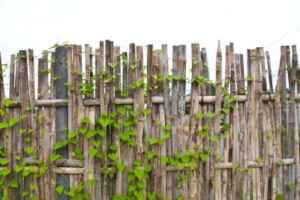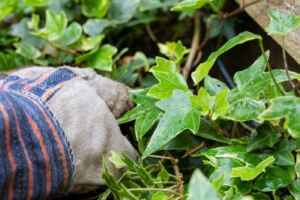These unusual vines have the potential to enhance the look of a property’s fence in the environment. They may also be an eyesore that expands uncontrollably and needs constant attention. These vines can cause your fence to deteriorate. The vine on your fence must be removed and destroyed, allowing for improved shrub or plant growth possibilities in the region.
One of the most common questions asked is “What is the best way to stop vines from growing on my fence?” There are a few options available to you. One option is to physically remove the vine from the fence. This can be done by hand, or with the help of a power washer or other tool. Another option is to use a herbicide to kill the vine. This is usually the most effective method, but it does require care and attention to make sure that the herbicide doesn’t damage your fence or other plants in the area. That is why having removed the vine naturally is so important.
What Is The Best Natural Way To Stop Vines From Growing On Your Fence?
Vines growing on your property might have a variety of problems. They may strip surrounding ornamental plants and, if they climb your fence, vines can cause a lot of damage. Aside from the devastation, they are unsightly and give your yard an unclean appearance in your lawn. It is possible that eliminating woody vines may require numerous attempts. Many herbicides on the market will help you achieve success. Many people are looking for an environmentally conscious way.
 Try White Vinegar
Try White Vinegar
The best natural way to stop vines from growing on your fence is to use white vinegar. White vinegar is a non-selective herbicide, which means it will kill any plant it touches.
- This is perfect for those pesky woody vines that seem impossible to get rid of. It would be best if you were very careful when using white vinegar as an herbicide.
- It will kill any plant it touches, so be sure to only spray the vines and not the surrounding plants or grass.
- To use white vinegar as an herbicide, mix one-part white vinegar with three parts of water in a pump sprayer.
Pump the sprayer to get the mixture moving and then spray the vines until they are completely saturated. The vinegar will kill the vines within a few days. You may need to reapply it after heavy rain or if the vine regrows.
Salt
Another natural way to stop vines from growing on your fence is to use salt. Salt is also a non-selective herbicide, so be careful when using it. You don’t want to kill your plants or grass accidentally.
- To use salt as an herbicide, mix one-part salt with eight parts of water in a pump sprayer.
- Pump the sprayer to get the mixture moving and then spray the vines until they are completely saturated.
The salt will kill the vines within a few days. You may need to reapply it after heavy rain or if the vine regrows.
Baking Soda
Another natural way to stop vines from growing on your fence. Baking soda is a non-selective herbicide, so be careful when using it.
- You don’t want to kill your plants or grass accidentally.
- To use baking soda as an herbicide, mix one-part baking soda with two parts of water in a pump sprayer.
Pump the sprayer to get the mixture moving and then spray the vines until they are completely saturated. The baking soda will kill the vines within a few days. You may need to reapply it after heavy rain or if the vine regrows.
Soap
Dish soap is another natural way to stop vines from growing on your fence. Dish soap is a non-selective herbicide, so be careful when using it.
Again, you don’t want to kill your plants or grass accidentally.
To use dish soap as an herbicide, mix one-part dish soap with four parts of water in a pump sprayer.
Pump the sprayer to get the mixture moving and then spray the vines until they are completely saturated. The dish soap will kill the vines within a few days. You may need to reapply it after heavy rain or if the vine regrows.
Try A Tarp Or Role Of Plastic
These pesky plants can be wiped out if you simply by blocking the sunlight. They require sunlight to live. So by covering the entire length of the fence where vines are growing with thick black plastic or a tarp it will slowly kill off the vines.
- To keep the cover from blowing away, hang it over both sides and attach the ends with stones, and bricks, or fasten them to the ground with ropes and stakes.
- It’s possible that because of the fence, it might be difficult to block all of the light from reaching the root.
If you must apply herbicides at the base of the fence, use a non-selective one to kill off the vines as high up on the fence as possible. Then lay the cover over the fence. By doing this, you should be able to eventually eradicate all of the vines.
 Mechanical Removal
Mechanical Removal
If you want to remove vines from your fence, you can use a machete or hand saw to cut and pull them away. Cut the vines into manageable chunks, so you may carry them.
- Start at one end of the fence and work your way toward the other. To make your task go more rapidly, have a companion on the opposite side cutting the vines simultaneously.
- Cut as near to the root of the vine as possible, then dig it out.
If you can’t remove the entire root system, use a chemical herbicide to destroy any remaining pieces. Alternatively, continue trimming new growth as it appears. This will eventually starve the plant and kill it.
Kudzu Is One Of The Toughest Vines To Kill
Kudzu is a fast-growing, climbing vine that can smother trees and other plants. It’s considered an invasive species in many parts of the world, including the southeastern United States.
- If you have kudzu growing on your fence, it’s important to remove it as soon as possible.
- Kudzu can grow up to a foot per day, so it can quickly take over your yard if you don’t keep on top of it.
The best way to remove kudzu is to cut it down and then dig out the roots. This can be a big job, so you may want to hire a professional if you have a lot of kudzu to remove.
- Once the kudzu is gone, you can prevent it from coming back by regularly mowing or herbicide the area.
You may also want to put up a physical barrier, like a fence, to keep kudzu from growing back.
Sometimes The Natural Methods Do Not Work- Herbicides
These are the two less evasive options:
Glyphosate
- This method is a less-harmful herbicide than other types since it leaves little residue in the soil that might harm plants or water sources. Glyphosate is usually sprayed directly to vines as a spray or with a paintbrush during application. When no rain is expected, apply herbicides anytime there will be no wind to carry them to other areas.
- 2,4-D amine herbicide
- This is a selective herbicide, which means it will kill broadleaf plants but not grasses. 2, the 4-D amine is most effective when used in early spring before vines produce many leaves. This chemical is available in several forms: granules, liquids, and wettable powders. It is mixed with water and applied to vines with a pump sprayer.
- You will find the 2, 4-D amine in products such as
- ‘Weed-B-Gon Chickweed, Clover and Oxalis Killer2’
- made by Scotts, ‘Ortho MAX Poison Ivy
Triclopyr
It is a weed killer that works on woody shrubs, vines, and broadleaf weeds. Apply it to the leaves when vines are actively growing. To apply the spray over the freshly cut ends, use a shielded sprayer or a paintbrush after cutting as much of the vine as possible from the fence.
You will find the Triclopyr in products such as:
‘Bonide BK-32 Concentrate Brush Killer’ and
‘Roundup Poison Ivy Plus Tough Brush Killer.
 Prevention
Prevention
This is the best way to deal with vines is to prevent them from growing in the first place. This can be done by regularly trimming any vines that do grow and by keeping the area around your fence clear of debris. You can also put up a physical barrier, like a fence, to keep vines from growing on your property.
Conclusion
There are a few different strategies to prevent vines from developing on your fence naturally. Vinegar, salt, baking soda, dish soap, and even a tarp or piece of plastic are all viable options. If you have kudzu, it’s critical to get rid of it as soon as possible. You can keep it away by mowing, herbicide, or putting up a fence. If you have any other type of vine, you can try to remove it by cutting it down and then digging out the roots.
If there are no other options, you can also use a chemical herbicide, but this should be your last resort. The best way to deal with vines is to prevent them from growing in the first place. This can be done by regularly trimming any vines that do grow and by keeping the area around your fence clear of debris. You can also put up a physical barrier, like a fence, to keep vines from growing on your property.

